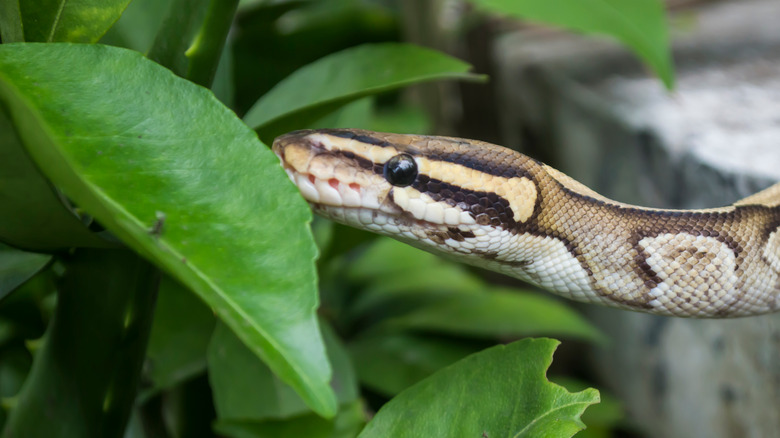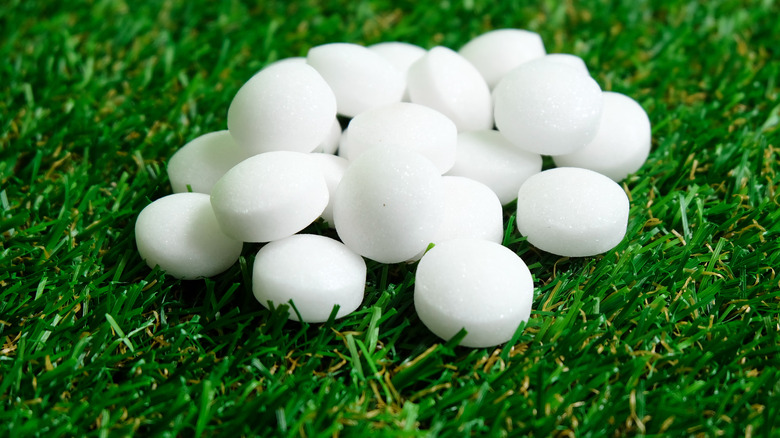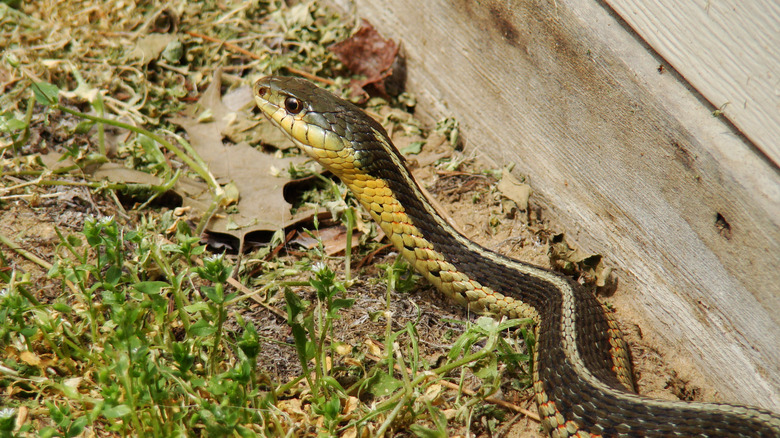Think Twice Before Trying This Popular Method To Get Rid Of Snakes In The Yard
Finding a snake lurking in your garden or yard isn't an enjoyable experience for many people, but not all of the DIY and other keep-snake-away products actually work. Any product that claims it contains sulfur that works as a natural deterrent to snakes isn't likely to work well for you. The reason is simple. Sulfur is an expensive ingredient in those products, and there's no formal research that indicates it works to keep the slithering pests out of your yard. Sulfur claims are a bit of snake oil themselves, according to various experiments and studies.
Some products claim sulfur is a skin irritant for the snake, and as a result, it will not come into an area where there's a higher amount of sulfur present. Some products contain a combination of naphthalene, which is the main ingredient in mothballs, and sulfur. The products typically require you to place them in a perimeter border around the area you wish to keep them out of, and the strong scent of the product is what ultimately deters the snakes from entering that space.
You may be looking for a fast solution to keep snakes out of your yard so you don't have to worry about putting your hands into the soil to pull a weed. There are other natural and effective strategies to remove snakes from the area, and you can call a professional in for some help. Once you do that, it also helps to put a few prevention strategies in place.
What not to do to protect your yard from snakes
Sulfur certainly has no real ability to keep snakes away, and what's more, if animals eat it in high doses, it can lead to health complications and even be fatal due to the damage it causes within the digestive system. Keep in mind that this also includes larger animals such as deer that may be attracted to it and even your pets if they consume it or if they get it on their paws or fur and then lick them clean.
Also, note that the other main ingredient in these products is mothballs, and while many people claim that the strong scent of mothballs can also repeal snakes, it's not a foolproof way of ridding your yard of them. It, too, can be dangerous to any animal that eats them. Some mothball manufacturers place warnings about not using these products outside because of the toxicity risk they present.
There are a few other things that you shouldn't do either, including the use of golf balls or ceramic eggs with the expectation that the snake will eat them and die slowly. That could happen, but it will take weeks and is inhumane. You shouldn't put sticky traps or release predators to snakes, like kingsnakes, into the yard, either. These methods may work to get rid of the pest, but they are not safe to do, and they certainly will not prevent snakes from coming back again later.
What to do to keep snakes out of your yard
If you have a snake in your yard now, call an exterminator to remove it for the fastest solution. The second strategy will also work for the prevention of further invasions. That's simply to make the space less desirable for snakes. The snake is there to find a food source and has no interest in humans. However, they will continue to move from place to place until they find a location where they can routinely get access to food.
You can make your yard less desirable in several ways, then. Remove birdfeeders and other food sources that bring in mice, birds, or larger pests. These are what the snake is after, and once you remove these food sources, those critters move on, and snakes follow them. Also, keep all of your pet's food indoors and the trash can locked up tight.
You also want to keep the space less desirable by trimming back your shrubs and keeping any hidden areas cleaned out of any leaves. It's also a good idea to seal spaces under your desk or remove the woodpile where they can find a natural area of protection. Choose sharp mulch to keep snakes out, too. Keep your grass cut short, as that makes it much harder for the snake to hide and puts them more at risk of birds of prey snatching them for their own food source.


